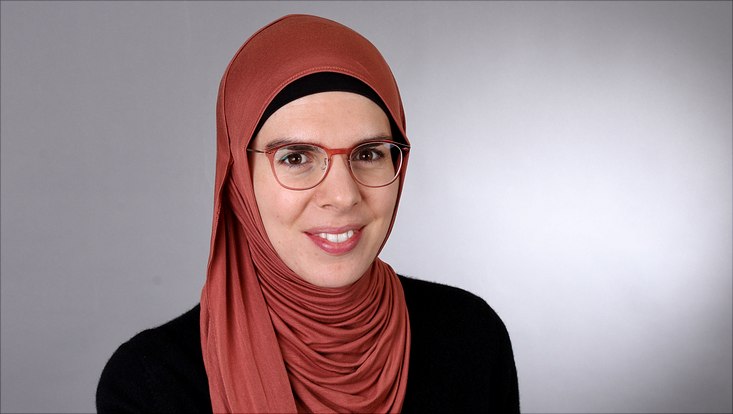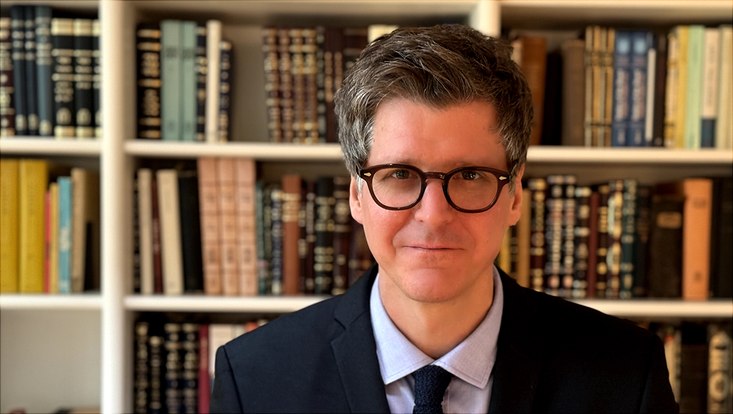Welcome aboard!“For Islamic theology, Hamburg is the place to be”Prof. Dr. Mira Sievers strengthens the Faculty of Humanities
8 July 2024, by Sievers/Red.

Photo: Dorothé Bogner
Every year, Universität Hamburg welcomes numerous new researchers. This series introduces them and their areas of research. This time, it is the Islamic theologian Prof. Dr. Mira Sievers.
Prof. Dr. Mira Sievers came to the University of Hamburg from Humboldt-Universität zu Berlin in Summer Semester 2024 to commence her appointment as a professor of Islamic theology in the Faculty of Humanities.
My research area in 3 sentences:
I deal with several areas of Islamic theology, focusing on Islamic systematic theology (kalam) and the interpretation of the Koran. I am particularly interested in ethical discussions that are also highly relevant to contemporary issues. I often conduct my research from a gender and interreligious perspective.
This is how I explain my research to my family:
For Muslims, the Koran and other traditional Islamic texts are not just any texts; rather, they play a central role in interpreting the world. At the same time, however, they are also the subject of academic research at the University. Islamic theology thus asks how these texts can be appropriately understood given the realities of our lives today, how they came about, how they were read in the past, and what they mean to Muslims. At the University, this research is carried out on a scientific basis, taking into account current research from various disciplines and traditional interpretations in the classical Islamic scientific traditions.
That’s why I’m looking forward to Hamburg—both the city and the University.
So far, all the people who live here or come from here have told me that Hamburg is the most beautiful city in the world! I am very much looking forward to learning to share this conviction. I find the proximity to the water, the tradition of cosmopolitan openness, and the wide range of cultural activities extremely attractive.
At the University, I am looking forward to being able to conduct research with colleagues from so many disciplines and especially theologies. The long tradition of Islamic studies at the University, the Academy of World Religions in the Department of Religions, and the many fascinating subjects in the Faculty of Humanities combine to create a wonderful environment.
Moreover, Hamburg is also where Islamic studies were taught and studied at a high level several decades before the official founding of the subject in 2010 (and where several current professors of the subject were trained) and where interreligious dialogue has been practiced for longer than elsewhere. Lastly, University of Hamburg is also where Katajun Amirpur became the first woman to be appointed to a professorship in Islamic theology in Germany. In short, Hamburg is the place to be for Islamic theology.
These are my plans at Universität Hamburg:
Initially, I would like to work primarily to ensure that the newly founded Institute of Islamic Theology becomes as exciting a location as possible for our subject, where people want to study and conduct research. The establishment of several degree programs is planned in both teaching training and beyond.
One current project deals with bettering anchoring Islamic philosophy in school lessons. In another project, an interreligious study and source book on gender issues is being developed. However, it is also important to me to learn as much as possible about the concerns of the Muslim community in Hamburg and to bring the work of university Islamic theology to the wider community.
This is why students should attend my courses:
My courses and those of my colleagues offer the opportunity to engage with the religious sources of Islam and to read them in the light of contemporary issues. The objective is that students acquire the ability to move independently within the theological tradition of Islam. But it is also about dealing with real issues: the difficult topics such as free will, the justice of God, and relations between the sexes have an important place in my teaching. In short, they’ll never get bored!
Reaching out to the world—I work with the following international and federal institutions and universities:
The first workshop at the institute in June was held by a researcher from the City University of New York in the United States, and I am currently in talks about a collaboration with the Royal Institute for Inter-Faith Studies in Jordan.
In my current research project, we are examining marriage in the early writings of Judaism, Christianity, and Islam together with colleagues from 3 other universities: the University of Halle, Stanford University in the United States, and the University of Graz in Austria. There are plans to collaborate with other academic institutions in the future, for example, from Turkey and Qatar.
My research is important to society because:
It is important that the public discussion about Islam and Muslims in Germany is conducted objectively and based on facts. Islamic theology has the task of contributing to this through its research and contributing its expertise.
Particularly given the difficult situation since Hamas’s attack on 7 October 2023, the Gaza war, and the discussion on coexistence in Germany, it is important—for example—to keep an eye on the mutual relationship between Judaism, Christianity, and Islam and to show the extent to which these 3 religions and their theologies are historically and currently related to each other.
However, my research is also important for the discussion within the Muslim community. A number of current problems are of an ethical nature, so Islamic theology can make a contribution here.


